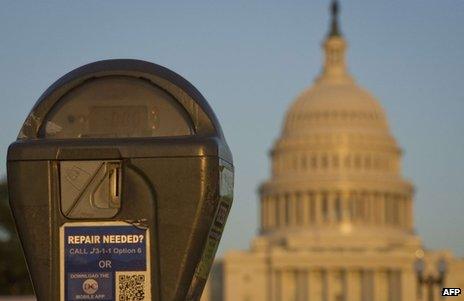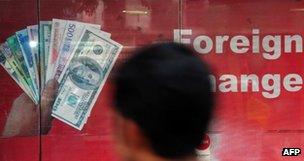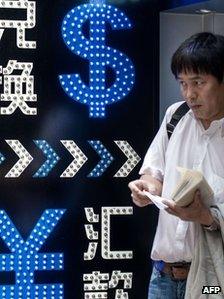Why hasn't the debt ceiling debacle cracked confidence in the dollar?
- Published
- comments

In the week the father of efficient market hypothesis, Eugene Fama, received the Nobel Prize for Economics, it is moot whether the behaviour of investors - as uncertainty escalates over whether the US can pay its debts - supports or disproves the idea that markets are the best information processing machine we have.
To the bystander (and unfortunately none of us can really be dispassionate bystanders on this, because if the dollar goes pop, we're all covered in goo), what's going on looks odd.
On the one hand, it has become a bit harder and more expensive for the US to borrow for very short periods by issuing three-month and six-month Treasury bills.
Arguably, that represents a rational response by investors to the growing risk that Congress will not approve an increase in the debt ceiling, or the amount the Federal Government can borrow, by Thursday's deadline, and that the Federal Government will struggle - for a bit at least - to repay maturing debts.
So in that sense investors are taking seriously the extraordinary looming prospect of the government of the biggest economy in the world, whose currency and debt underpin the entire global financial system as - in effect - the collateral and benchmark for all financial transactions, defaulting on what it owes.
Now you might think if that were to happen, the status of the dollar as the world's reserve currency - the currency that oils the wheels of global capitalism - would be called into question, and that momentum would build in some way to develop a new reserve currency.
And as the ratings agency Fitch, either helpfully or unhelpfully pointed out Tuesday night - when signalling the strong likelihood (I would say the racing certainty) that it will strip US sovereign debt of its AAA accreditation - were the dollar to lose its reserve currency status, all sorts of bad things would follow for the US economy.
Not least of those bad things would be that the cost of borrowing for US government, households and businesses would rise in a sustained way, with a detrimental impact on the long-term growth prospects for that economy.

The dollar is still seen as a safe haven
Now here's the funny thing. This crisis has not yet led to any significant increase in the implicit cost for the US government of borrowing for 10 or 30 years. In fact the price of US Treasury bonds is actually higher than it was just a few months, which implies that it is cheaper for the US government to borrow.
What on earth is going on? How can investors hate dollar debt that has to be repaid tomorrow, but love dollar debt that is due for repayment in 10 years?
Well, it is for three reasons, of which two are semi-rational and one seems a bit bonkers.
The semi-rational ones are these:
First, it is very likely that the partial shutdown of the US economy, caused by the failure of Republicans and Democrats to agree a budget, the impasse also underlying the debt-ceiling debacle, will take momentum out of America's economic recovery.
Also the uncertainty over whether the US will default may be depressing economic activity.
So the reasonable calculation is that in those circumstances the US central bank, the Federal Reserve, will continue to buy official bonds, and create new money, at a rate of $85bn a month, for rather longer than would otherwise have been the case.
That, to state the blinkin' obvious, underpins demand for US government debt, and keeps borrowing costs low.
Second, there are no serious candidate currencies to replace the dollar as a reserve currency in the short term.
The idea of the euro becoming the world's reserve currency would be regarded as laughable by most investors, at a time when few of them are convinced that the euro is forever - even if there hasn't been a major eurozone accident for a couple of years.

China's yuan is also known as the renminbi, or RMB
And for all the incremental steps to liberalise China's capital and foreign exchange markets, the RMB is a million miles from being a liquid, easy-to-trade currency. It is a long way from offering a safe haven alternative to the dollar (although George Osborne's attempts to establish the City as the main offshore centre for RMB trading shows what he thinks about the long-term trend - see The risks for the City of becoming China's offshore centre).
As for the long-discussed ideas that the rich countries of the world will get together to promote some kind of new-fangled, mutually supported reserve currency, the notion may be attractive but the technical difficulties are immense.
So, for now, the dollar is the only reserve currency we have.
But here is the paradox which would be a masterpiece of surrealism if you could hang it on the wall.
What almost always happens when there is global economic and financial uncertainty is that investors flock to the dollar as that vaunted safe haven.
And even though it is the dollar that is the very source of our current global economic and financial uncertainty, there is no stampede out of the US currency. In fact on Tuesday, it strengthened a bit.
If you wanted to rationalise what's happening, you would say the following: that investors are convinced that Congress will come to its senses and that there will be no long-term damage, from the global media spectacle of US legislators holding the prosperity of the world to ransom, to confidence in the safe haven status of US official assets.
Or you might argue that most investors find it difficult to see further than the end of their noses or the close of the trading day, whichever is sooner.